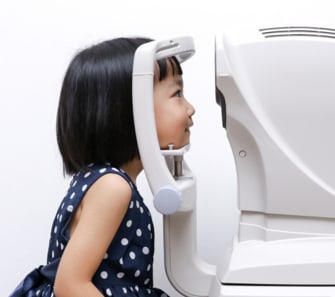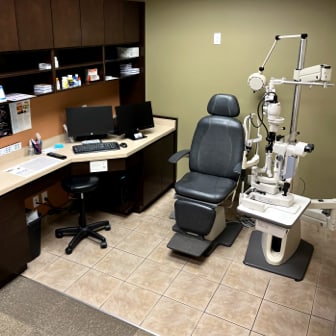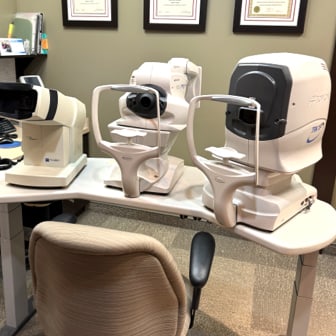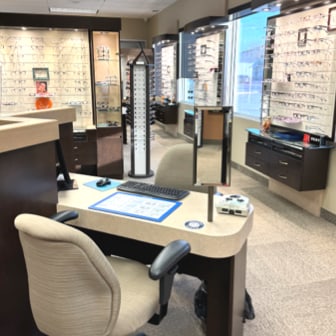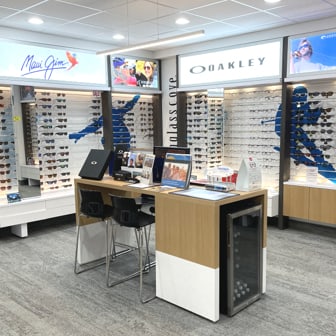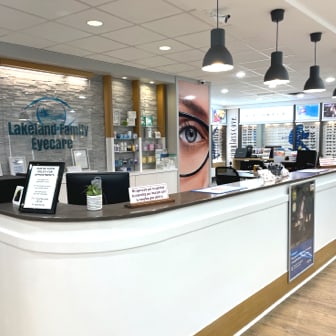AMD (Age-Related Macular Degeneration) is a disease of the eye that causes the gradual loss of sight as the patient ages. It is the leading cause of vision loss among Canadian men and women aged 60 years and older.
AMD is a chronic disease with no available cure at this time. For most patients, their sight is not likely to be restored after it is lost.
Early detection is crucial to potentially slowing the spread of this disease and its harmful effects on your vision.
How Macular Degeneration Works
Macular degeneration involves the retina. The retina is located inside the back layer of your eye and its responsibility is to record the images we see and relay them via the optic nerve to our brain.
The central portion of the retina is known as the macula; its purpose is to control our ability to see objects in fine detail and gives us colour vision. A healthy macula collects high definition images and transmits them to our brain.
Central vision loss occurs due to our body’s natural ageing process, as the cells of the macula deteriorate over time and your brain receives the images incorrectly from the retina.
Risk Factors for AMD
- Obesity
- Family history
- Smoking
- Age – Largest risk, can start as early as 40
- Ethnicity – Caucasians have the highest risk for developing AMD
- Poor diet
- Lack of exercise
Types of Macular Degeneration
Macular degeneration is broken down into two types, dry (atrophic) and wet (exudative). Those with AMD may have one or both types, with approximately 90% of AMD cases being dry and the remaining 10% being wet. Not everyone with AMD will develop advanced-stage AMD.
- Dry (Atrophic) AMD – Yellow deposits (drusen) in the macula are typical for this dry form of macular degeneration. As the drusen develop and grow in size and quantity, vision becomes increasingly distorted and dim. This will be especially noticeable when reading or doing detailed tasks.
When dry AMD reaches the advanced stages, the light-sensitive layers of your eye begin to thin. This ultimately leads to atrophy (tissue death) and central vision is likely to be completely lost. - Wet (Exudative) AMD – Wet macular degeneration is characterized by the formation of abnormal blood vessels underneath the macula. Inevitably, blood and other fluids leak from these poorly formed vessels, creating distorted vision and blind spots.
Advanced stages of wet macular degeneration presents with complete loss of central vision, a result of the abnormal vessels forming scar tissue.
AMD Symptoms
The symptoms of AMD vary as they depend on the stage that the macular degeneration has reached.
Early Stage AMD Symptoms – The only way to detect the early stages of macular degeneration is through regular eye exams. Vision is not noticeably affected. This is because AMD symptoms do not appear early on, and the disease usually progresses unnoticed.
Intermediate Stage AMD Symptoms – This stage of AMD is when vision loss issues begin. They include:
- Center of vision distorted
- Straight lines appear distorted
- Dark areas or complete white outs appear in center of vision
- Blurred vision
- Changes to colour vision
Advanced Stage AMD Symptoms – Those who are diagnosed with advanced stage macular degeneration are likely experiencing near to complete central vision loss.
AMD Treatment
Like many eye conditions, early detection via an eye exam is imperative to maintaining clear vision or delaying vision loss from macular degeneration.
As mentioned above, there is no cure for AMD. Prevention/management is the best course of action and can be influenced through lifestyle changes. These changes include:
- Cessation of smoking
- More exercise
- Healthy and nutritious diet including special eye vitamins to improve the retinal circulation
- Protecting your eyes from the harmful UV sun rays
- Continued regular eye exams











